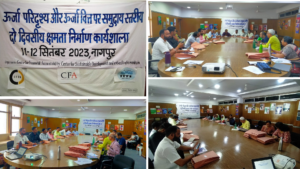A two-day workshop on coal issues and energy scenarios organised in Nagpur
 Nagpur, 12.09.2023: Community Level Capacity Building Workshop on Thermal Power Plant, Coal Issues and Energy Landscape was organized at MLA House (Hostel), Conference Hall, Civil Line, Nagpur on 11-12 September 2023. Around 40 people from thermal power plant affected communities of Madhya Pradesh and Maharashtra participated in the workshop. The two-day workshop was organised by Centre for Financial Accountability New Delhi, Centre for Sustainable Development, Nagpur and Bargi Bandh Visthapit aur Prabhavit Sangh.
Nagpur, 12.09.2023: Community Level Capacity Building Workshop on Thermal Power Plant, Coal Issues and Energy Landscape was organized at MLA House (Hostel), Conference Hall, Civil Line, Nagpur on 11-12 September 2023. Around 40 people from thermal power plant affected communities of Madhya Pradesh and Maharashtra participated in the workshop. The two-day workshop was organised by Centre for Financial Accountability New Delhi, Centre for Sustainable Development, Nagpur and Bargi Bandh Visthapit aur Prabhavit Sangh.
The objective of the workshop was to familiarise the participants with the redressal means available to them when they face harmful health, social, and environmental impacts arising from Thermal power projects. Second, the aim was to discuss the emerging trends in the energy landscape and to emphasise the importance of just and equitable energy transition. Third, the purpose was to enable a platform where affected communities can put forward their concerns.
Speaking about India’s Energy Landscape, the role of energy in human society and its sources, such as coal, hydropower and nuclear projects, Anitha Sampath of the Center for Financial Accountability (CFA) talked about the detrimental effects on the environment, health and climate while also elaborating on the advantages and disadvantages of renewable sources of energy.
India’s fossil fuel reserves are limited. Known reserves of oil and natural gas can last up to 18 and 26 years, respectively, depending on current reserves and production rates. India has huge coal reserves (84 billion tonnes) which can last for about 200 years. Increasing ash content of Indian coal from increasing number of thermal power plants as well as associated greenhouse gas emissions are major concerns.
Rajkumar Sinha, from the Bargi Dam Displaced and Affected Association, spoke on the energy landscape of Madhya Pradesh and the contribution of various sources of regionally concentrated energy, and the demand and availability of energy and increasing power consumption by private companies. He said, “Land acquisition law and its real estate, the government and private companies are taking away land from farmers and tribals on a large scale in the name of electricity. What does the land acquisition law say, and how do people use it, and how can they save their land and take it back, is something we need to understand.”
Leena Buddhe of the Center for Sustainable Development explained how to measure and monitor the impact of large energy projects on the environment, water pollution and health and also how to use this data in people’s struggles. A study was conducted by CFSD in 2021 in 21 affected villages around Khaparkheda and Kordi Thermal Power Plant in Nagpur district where water and dust samples were taken from 25 locations and it was found that the quality of water in these villages is quite poor. Due to which, the health of the people of these 21 villages is being affected.
Amitanshu Verma, senior researcher at the Center for Financial Accountability, New Delhi, shed light on institutions providing energy finance. He said, “Banks financing energy projects are becoming socially and environmentally responsible. Loans should not be given to projects which cause displacement, health and environmental impacts.” Amitanshu Verma said that banks and financial institutions need to implement a comprehensive accountability system.
Jammu Anand from Nagpur highlighted the energy consumption scenario in urban areas. He said, “Energy availability for poor and marginalized communities, large scale electricity being provided to industries and large shopping malls in the name of urbanization, changing lifestyles in cities to understand the increasing use of energy. It is also important to understand that does the entire population of a city use energy equally? Otherwise, it is necessary to find out that which component in the city uses more energy and who pays the price?”
This issue also came up that the way cities are being built increases energy consumption uncontrollably. So we have to find new options for urban expansion.
The Government of India has been continuously emphasizing the construction of large projects in the name of development of the country for the last few decades. These projects are being viewed in relation to the growth rate of India’s Gross Domestic Product. We know that on the one hand, private companies are constantly increasing their control over natural resources in the name of energy, and on the other hand, companies are looting public money in the name of development.
Around 40 people from the communities and organizations affected by Madhya Pradesh’s Jhabua Thermal Power Plant, Gadarwara Thermal Power Plant, Chutka Nuclear Project, Today Energy and Maharashtra’s Koradi Thermal Power Plant, Khapadkheda Thermal Power Plant, Chandrapur Thermal Power Plant and Mauda Thermal Power Plant, participated in the workshop and shared their experiences.

